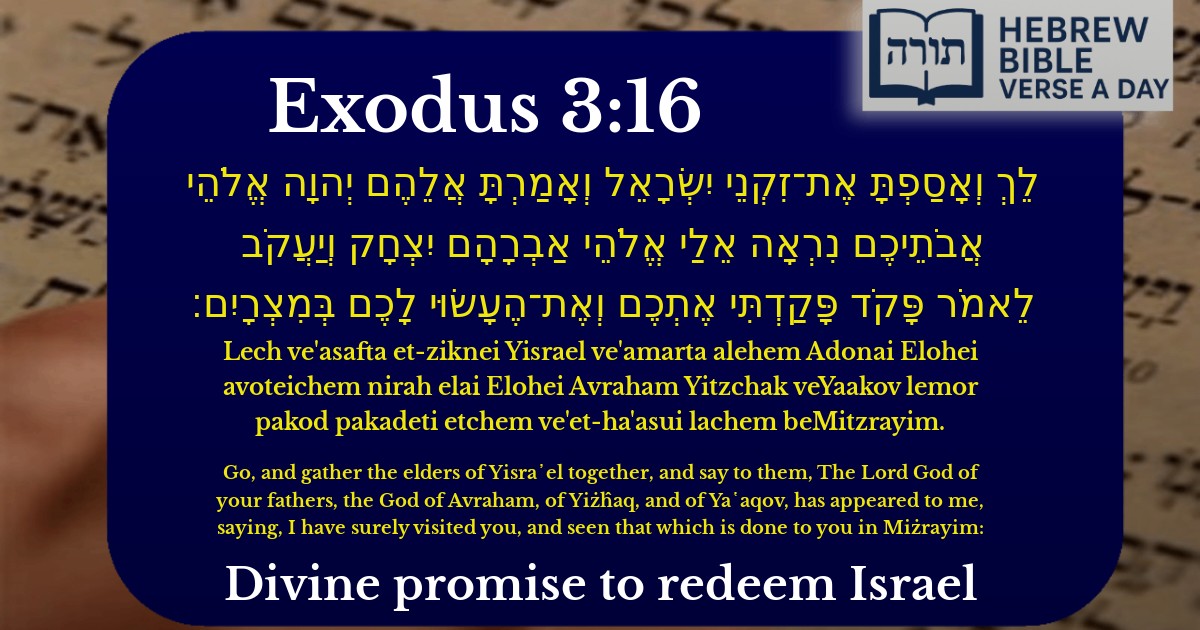Join Our Newsletter To Be Informed When New Videos Are Posted
Join the thousands of fellow Studends who rely on our videos to learn how to read the bible in Hebrew for free!
Hebrew Text
לֵךְ וְאָסַפְתָּ אֶת־זִקְנֵי יִשְׂרָאֵל וְאָמַרְתָּ אֲלֵהֶם יְהוָה אֱלֹהֵי אֲבֹתֵיכֶם נִרְאָה אֵלַי אֱלֹהֵי אַבְרָהָם יִצְחָק וְיַעֲקֹב לֵאמֹר פָּקֹד פָּקַדְתִּי אֶתְכֶם וְאֶת־הֶעָשׂוּי לָכֶם בְּמִצְרָיִם׃
English Translation
Go, and gather the elders of Yisra᾽el together, and say to them, The Lord God of your fathers, the God of Avraham, of Yiżĥaq, and of Ya῾aqov, has appeared to me, saying, I have surely visited you, and seen that which is done to you in Miżrayim:
Transliteration
Lech ve'asafta et-ziknei Yisrael ve'amarta alehem Adonai Elohei avoteichem nirah elai Elohei Avraham Yitzchak veYaakov lemor pakod pakadeti etchem ve'et-ha'asui lachem beMitzrayim.
Hebrew Leining Text
לֵ֣ךְ וְאָֽסַפְתָּ֞ אֶת־זִקְנֵ֣י יִשְׂרָאֵ֗ל וְאָמַרְתָּ֤ אֲלֵהֶם֙ יְהֹוָ֞ה אֱלֹהֵ֤י אֲבֹֽתֵיכֶם֙ נִרְאָ֣ה אֵלַ֔י אֱלֹהֵ֧י אַבְרָהָ֛ם יִצְחָ֥ק וְיַעֲקֹ֖ב לֵאמֹ֑ר פָּקֹ֤ד פָּקַ֙דְתִּי֙ אֶתְכֶ֔ם וְאֶת־הֶעָשׂ֥וּי לָכֶ֖ם בְּמִצְרָֽיִם׃
לֵ֣ךְ וְאָֽסַפְתָּ֞ אֶת־זִקְנֵ֣י יִשְׂרָאֵ֗ל וְאָמַרְתָּ֤ אֲלֵהֶם֙ יְהֹוָ֞ה אֱלֹהֵ֤י אֲבֹֽתֵיכֶם֙ נִרְאָ֣ה אֵלַ֔י אֱלֹהֵ֧י אַבְרָהָ֛ם יִצְחָ֥ק וְיַעֲקֹ֖ב לֵאמֹ֑ר פָּקֹ֤ד פָּקַ֙דְתִּי֙ אֶתְכֶ֔ם וְאֶת־הֶעָשׂ֥וּי לָכֶ֖ם בְּמִצְרָֽיִם׃
🎵 Listen to leining
Parasha Commentary
📚 Talmud Citations
This verse is quoted in the Talmud.
📖 Sotah 5a
The verse is referenced in a discussion about the importance of humility and how God appears to the humble, using Moses as an example.
📖 Sanhedrin 111a
The verse is cited in a discussion about the merits of the forefathers (Avraham, Yitzchak, and Yaakov) and how their righteousness benefits their descendants.


The Command to Gather the Elders
The verse begins with the command to Moshe: "לֵךְ וְאָסַפְתָּ אֶת־זִקְנֵי יִשְׂרָאֵל" ("Go, and gather the elders of Israel"). Rashi explains that the elders were the distinguished and wise leaders of the tribes, chosen for their wisdom and righteousness (Rashi on Shemot 3:16). The Midrash Tanchuma (Shemot 18) adds that these elders were the same individuals who had previously risked their lives to resist Pharaoh's decrees, demonstrating their unwavering commitment to the Jewish people.
The Divine Revelation to Moshe
Moshe is instructed to tell the elders: "יְהוָה אֱלֹהֵי אֲבֹתֵיכֶם נִרְאָה אֵלַי" ("The Lord God of your fathers has appeared to me"). Rambam (Moreh Nevuchim 1:63) emphasizes that this phrasing underscores the continuity of the covenant with the Avot (Patriarchs). The mention of Avraham, Yitzchak, and Yaakov by name reinforces that Hashem's relationship with Bnei Yisrael is rooted in the merit of their forefathers.
The Promise of Divine Intervention
The phrase "פָּקֹד פָּקַדְתִּי אֶתְכֶם" ("I have surely visited you") uses a doubling of the verb "pakod," which the Talmud (Berachot 55a) interprets as a sign of certainty and immediacy—Hashem's redemption is both assured and imminent. The Sforno explains that this visitation refers not only to noticing their suffering but also to the divine plan to redeem them (Sforno on Shemot 3:16).
The Recognition of Their Suffering
The concluding phrase, "וְאֶת־הֶעָשׂוּי לָכֶם בְּמִצְרָיִם" ("and seen that which is done to you in Egypt"), is interpreted by the Midrash (Shemot Rabbah 3:7) as referring to both the physical oppression and the spiritual challenges Bnei Yisrael faced under Egyptian rule. The Kli Yakar adds that this acknowledgment of their suffering was meant to strengthen their faith in the coming redemption (Kli Yakar on Shemot 3:16).
Key Themes in Orthodox Jewish Thought